Goethe University has two new vice presidents. On Wednesday, the extended Senate elected Prof. Dr. Sabine Andresen to the newly created position of Vice President Career Development and Support, and Prof. Dr. Viera Pirker as Vice President Teaching and Study. Pirker succeeds Prof. Dr. Christiane Thompson, who, as announced at the beginning of her term of office, did not stand for re-election, and will instead return her focus on her academic work at the Institute of General Educational Science. Re-elected as members of the Executive Board were Prof. Dr. Bernhard Brüne, as Vice President Research, and Prof. Dr. Michael Huth, as Vice President Quality Management, Infrastructure and Technology Transfer. Having started his six-year term of office in 2022, Ulrich Schielein, Vice President Digitalization and Chief Information Officer (CIO), was not up for election. Goethe University’s extended Senate consists of the members of the Senate and their deputies.
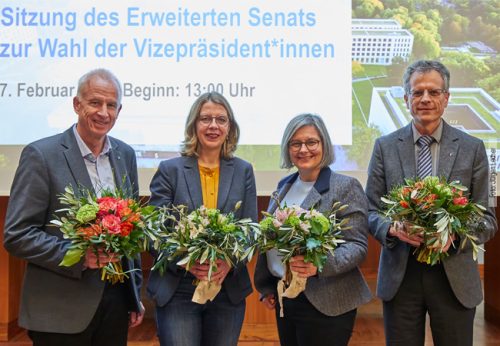
The new executive team will begin its work on April 1. Commenting on the election, Goethe University President Prof. Dr. Enrico Schleiff said, „I would like to thank the extended Senate for the trust it has placed in our executive board. In creating a new position for career development and support, our goal is to strengthen our work both in terms of content and strategic focus, and put a stronger emphasis on promoting academics in the early career phase.“
Schleiff thanked the incumbent executive team for its commitment. „Over the past few years, all members have worked with the utmost professionalism, enormous dedication and great commitment in the interests of advancing our university’s development, and have defied numerous adversities, including the coronavirus pandemic, the energy crisis resulting from Russia’s war of aggression against Ukraine, as well as social conflicts that have played out on campus. I am just as grateful for the joint work we have conducted as I am for the successful substantive work each vice president has done in his or her respective fields.“
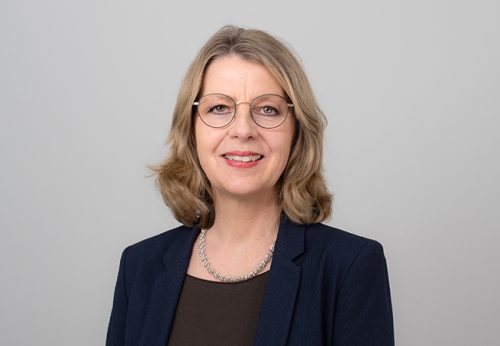
Prof. Dr. Sabine Andresen, Faculty of Educational Sciences, Institute of Social Pedagogy and Adult Education. After having completed her doctorate at Heidelberg University, Prof. Dr. Sabine Andresen wrote her postdoc at the University of Zurich on the relationship between childhood and politics using the example of the Pioneer Organization in the GDR. In 2005, she moved to Bielefeld University to take up a professorship in general educational science, where she also became dean of studies and, until her move to Goethe University, prorector for international affairs and communication. During her time as vice dean at Goethe University’s Faculty of Educational Sciences, she was involved in setting up an ethics committee and later became dean – a position she held until September 2023. From 2016 to 2021, she served as chair of the newly founded Independent Inquiry Into Child Sexual Abuse in Germany. She has been a full member of the Mainz-based Academy of Sciences and Literature since 2017.
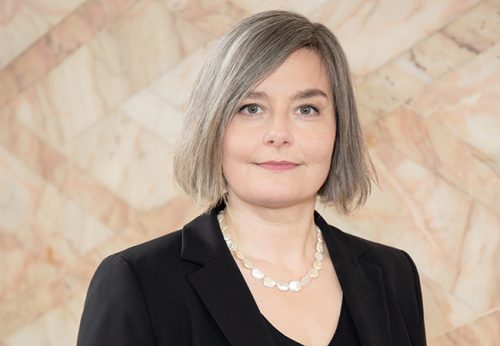
Prof. Dr. Viera Pirker, Faculty of Roman Catholic Theology, Professor of Religious Education and Media Studies. Prof. Dr. Viera Pirker studied Jewish Studies at the Hebrew University of Jerusalem and Catholic Theology at the University of Tübingen. She received her doctorate from the Institute for Pastoral Psychology and Spirituality at Sankt Georgen Graduate School of Philosophy and Theology. Following stints at the Universities of Vienna and Giessen, she has served as professor of religious education and media didactics teaching at Goethe University since 2020, conducting research in the triangle that consists of identity, media and education, and concentrating on processes related to religion and religious education. She is the Faculty of Roman Catholic Theology’s dean of studies and has been involved across faculties in the Senate Commission focusing on the interests of academics in the early career phase (ECR) as well as the QSL Commission.
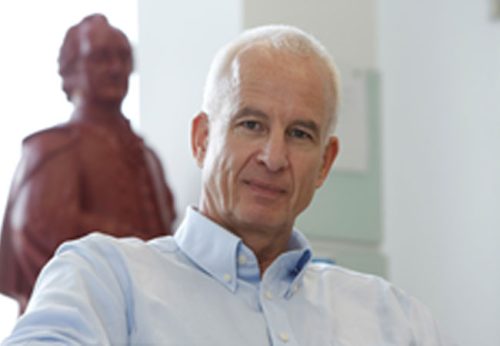
Prof. Dr. Bernhard Brüne, Faculty of Medicine, Institute for Biochemistry I. Prof. Dr. Bernhard Brüne studied biochemistry at the University of Tübingen, and completed his doctorate at the University of Konstanz. After stays abroad in the USA (GlaxoSmithKline) and Sweden (Karolinska Institutet), he habilitated in Konstanz in 1993. Hereafter followed professorships in Erlangen-Nuremberg and Kaiserslautern. Since 2004, he has been head of the Institute of Biochemistry I at Goethe University Frankfurt’s Faculty of Medicine. Brüne’s research focuses on mechanisms of innate immunity related to hypoxia and lipid signaling. In addition to teaching in the fields of medicine and dentistry, he is also involved in graduate training and the molecular medicine study program. He served as spokesperson of the Collaborative Research Center 815 (Redox Regulation) from 2009 to 2021, and since 2017 has headed the German Research Foundation-funded Research Training Group 2336 (Resolution of Inflammation). Before becoming Vice President Research, Early Career Researchers and Transfer, he served as dean of research and dean of preclinical studies at the Faculty of Medicine.
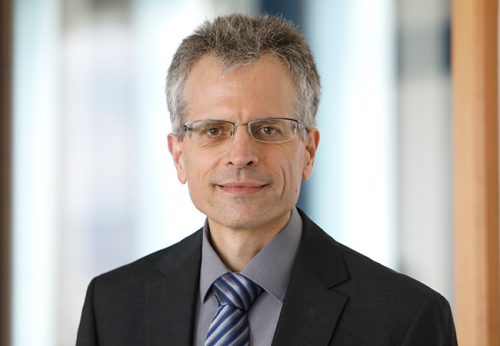
Prof. Dr. Michael Huth, Faculty of Physics, Institute of Physics. Prof. Dr. Michael Huth has been professor of experimental solid state physics at Goethe University Frankfurt since 2002, working with materials in which interactions result in complex multi-particle behavior. Understanding the properties of complex systems and finding strategies to specifically influence them through targeted observation and analysis is the main driver behind his scientific work. Huth served as managing director of the Institute of Physics as well as vice dean and dean of Goethe University’s Faculty of Physics.








